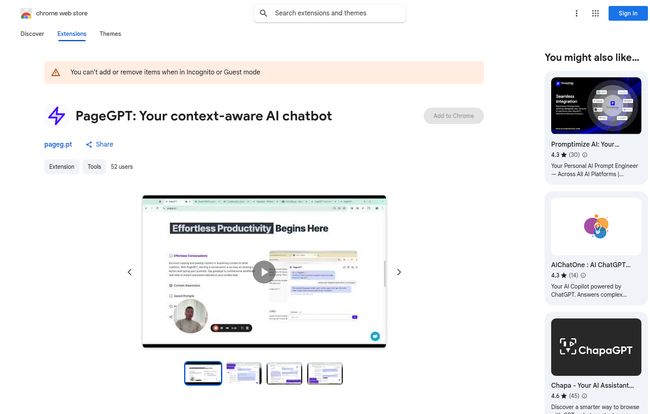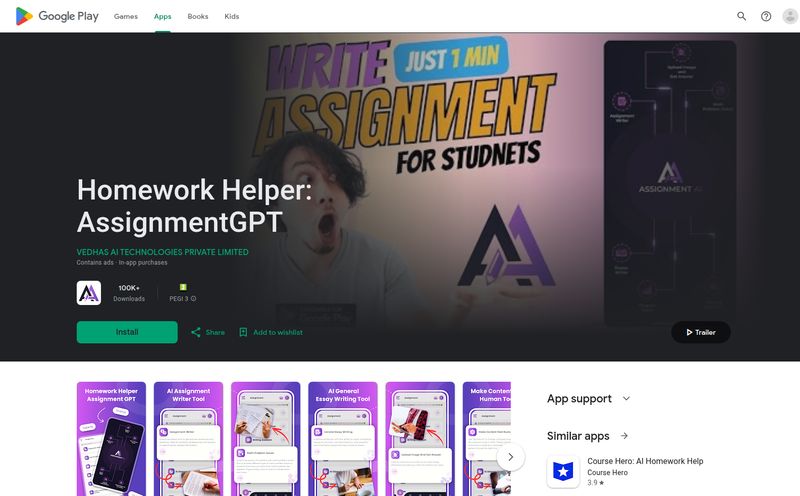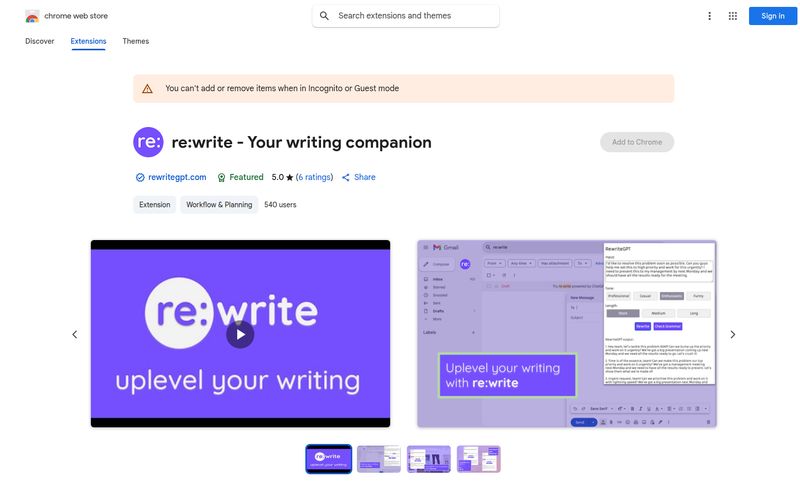How many browser tabs do you have open right now? And how many times today have you highlighted a chunk of text on one page, hit Ctrl+C, switched to your ChatGPT tab, pasted it in with a prompt like “summarize this for me,” and then switched back? If you’re anything like me, the answer is… too many. It's a clunky workflow we’ve all just accepted as the price of admission to the AI revolution.
It's this constant, tiny friction that wears you down over a long day of research, content planning, or just plain old internet rabbit-holing. It's the digital equivalent of having to get up and walk to a different room every time you need to find a file.
So, when I stumbled upon a Chrome extension called PageGPT, the headline alone—"Your context-aware AI chatbot"—made me sit up a little straighter. The promise? No more copy-pasting. An AI assistant that lives in your browser and already knows what you're looking at. A simple idea, really. But sometimes the simplest ideas are the most brilliant. The question is, does it actually deliver?

Visit Gamma
So, What Exactly is PageGPT?
Think of PageGPT as a clever little AI assistant that clips onto your browser. Instead of being a separate destination you have to visit, it comes along with you, page by page. Its main superpower is being “context-aware.” This just means it can read and understand the content of the webpage you’re currently on.
It’s like having a tiny, incredibly fast research assistant perched on your shoulder. When you land on a long, jargon-filled article, you don't have to explain it to your AI; it's already read it. You can just start asking questions: “What are the three main takeaways from this?” or “Draft a friendly email explaining this concept to a client.” It’s designed to be an efficiency engine, cutting out the middleman (the middleman being your copy-paste habit).
Getting Yourself Set Up
Getting started is pretty standard for a Chrome extension. You find it on the Chrome Web Store, click “Add to Chrome,” and you’re almost there. But here’s the key differentiator, and it’s a big one: PageGPT runs on your own personal OpenAI API key.
Now, for some of us in the tech and marketing world, that’s fantastic news. It means my queries aren’t being fed into some third-party developer’s system. It’s a direct line between me and OpenAI, and I just pay for what I use at their standard rates. It feels more private, more controlled. For others, the phrase “API key” might sound a little intimidating. It’s not as plug-and-play as some other tools, and it does mean that while the extension itself is free, using it isn't. You’re on the hook for your own OpenAI usage costs—which, to be fair, are usually pennies for this kind of work.
My Experience Using PageGPT (The Good Stuff)
I’ve been putting PageGPT through its paces for a while now, and I’ve gotta admit, its a pretty slick operator when it comes to streamlining my day-to-day grind.
A Genuine Time-Saver for Research
This is where it shines brightest. The other day, I was analyzing a competitor’s new service page. It was long, full of corporate-speak, and I just needed the brass tacks. Instead of my usual copy-paste routine, I popped open PageGPT and typed, “Act as an SEO specialist. Analyze the on-page SEO of this content and give me 5 suggestions for improvement.” Within seconds, it spat out a decent analysis of their H1s, meta description, and keyword density. Did it replace a full Ahrefs audit? Of course not. But for a quick, on-the-fly analysis, it saved me a solid 10 minutes. That adds up.
The End of That Awkward Copy-Pasting
I can't overstate how much of a quality-of-life improvement this is. Whether it’s summarizing a YouTube video transcript (yes, it can do that!), drafting a reply to a complicated customer support ticket, or just getting the gist of a news article I don’t have time to read, the workflow is just… smoother. The little popup window is resizable and movable, so you can tuck it into a corner and keep it open while you work. There's even dark mode support and a handy one-click copy button on the assistant’s messages. These are small touches, but they show the developer actually uses their own tool.
The Not-So-Perfect Side of Things
Look, no tool is perfect, especially one that’s still on version 0.5.1. It's more of a plucky upstart than a polished corporate product, and there are a couple of things to keep in mind.
That API Key Hurdle
We talked about this, but it’s both a pro and a con. The BYOK (Bring Your Own Key) model is great for privacy and control, but it's a barrier to entry for the less technically inclined. If you've never generated an API key before, it can feel like a bit of a faff. It's not hard, but it's one extra step that might turn some people off.
A Wrinkle in the Privacy Promise?
This one gave me pause. The extension’s page proudly claims it’s “privacy-first.” And the API key model supports that. However, if you dig into the “Privacy” section on the Chrome Web Store page, it discloses that it collects “Personally identifiable information” and “Financial and payment information.” That feels… contradictory. It’s likely boilerplate for extensions that might have future premium features, but it's a little confusing. It's something to be aware of and make your own judgment call on.
So Who is PageGPT Actually For?
After messing around with it, I have a pretty clear picture of the ideal user. If you're an SEO professional, a content marketer, a writer, a student, or a developer who uses AI multiple times a day as part of your job, PageGPT will probably feel like a breath of fresh air. It's for the power users who value workflow efficiency above all else and are comfortable with the concept of an API key.
It's competing in a crowded space with other AI sidebars and assistants, but its BYOK model really sets it apart for those of us who are a bit more particular about our data and costs. It's not trying to be a one-size-fits-all solution, and I kind of respect that.
The Final Verdict: Should You Install It?
So, does PageGPT kill the copy-paste dance? For me, mostly, yes. It has successfully removed one of the most tedious steps in my daily research process. It’s a focused tool that does one thing—context-aware AI on the page—and it does it well.
It’s not for everyone. If you’re a casual AI user or intimidated by API keys, you might want to stick with the free version of ChatGPT in a separate tab. But if you’re a professional who measures their day in minutes saved and values a streamlined workflow, then yes, you should absolutely give PageGPT a shot. It's a small change that could make a surprisingly big difference in your productivity.
Frequently Asked Questions
- 1. What is PageGPT in simple terms?
- PageGPT is a Google Chrome extension that puts an AI chatbot right on the webpage you're viewing. It can read the page's content, so you can ask it to summarize, analyze, or rewrite information without ever having to copy and paste text.
- 2. Is PageGPT free to use?
- The extension itself is free to install. However, it requires you to use your own OpenAI API key. This means you will be billed directly by OpenAI for your usage. For most typical text-based queries, these costs are very low, often just fractions of a cent per query.
- 3. How is PageGPT different from just using the ChatGPT website?
- The key difference is integration and context. PageGPT is integrated into every browser tab, eliminating the need to switch back and forth. Its context-awareness means it automatically knows what's on your screen, saving you the manual step of providing that context yourself.
- 4. Is PageGPT safe? What about my privacy?
- The use of your own API key is a strong point for privacy, as your queries go directly to OpenAI, not through the extension's developer. However, the developer does disclose some data collection in their privacy policy on the Chrome store, which is worth reviewing before you install.
- 5. Do I need to be a developer to get an OpenAI API key?
- Not at all! While the term sounds technical, OpenAI has a straightforward process. You just need to create an account on their platform, navigate to the API section, and create a new key. It's a copy-and-paste job that takes just a few minutes.



